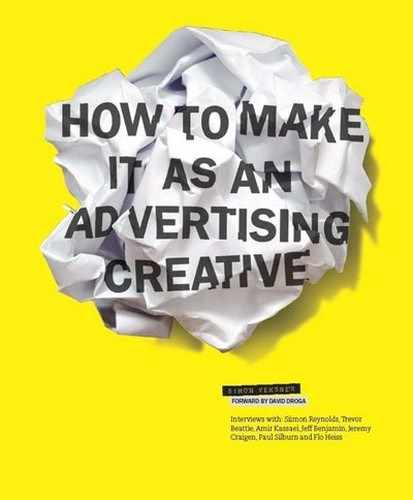Above-the-line: TV, print, and radio.
Account handler: person within an ad agency who acts as a liaison between the client and the rest of the agency, and has overall responsibility for the agency’s business with that client.
Ambient: advertising that is found “out there in the environment” rather than in traditional media like newspapers and magazines. Examples include ads on the side of coffee cups, at the bottom of golf holes, and on sidewalks. The possibilities are endless.
Animatic: storyboards that have been filmed, with added sound effects and camera moves.
Art buyer: acts as a liaison between the agency and photographers and illustrators. Also advises creatives who to use.
Below-the-line: direct mail, and other “direct to consumer” advertising such as direct-response TV advertising as opposed to TV brand advertising.
Book: portfolio.
Brief: document written by the planner that explains what the client’s requirements are for an advert, who the activity is being aimed at, what message they want to communicate, etc.
Campaign: a series of at least three advertisements on the same theme.
Creative director: has creative responsibility for one or more specific accounts, and is appointed by the agency’s ECD (executive creative director), the person in overall charge of the department.
Digital advertising: activity that appears on the internet, such as banners, facebook apps, games, microsites, and virals.
Direct advertising: same as “below-the-line.”
Engagement planner: if the account planner decides who the brand is going to talk to, the engagement planner decides what media should be used to reach them.
Grade: everything to do with the final look of a TV ad, for example how contrasty or color-saturated the film is. The process itself is known as grading.
Head of art: has overall responsibility for the imagery the agency sources for its print output. Advises creatives on which photographers and illustrators are right for a particular job.
Hotshop: small, highly creative agency.
Micro-network: an agency that aims to cover the world from a base of just one agency in each region, as opposed to one in each country.
Mood film: a film made of clips from movies or other ads, which demonstrates your idea.
Network agency: a group that has agencies in many countries. A network agency may have as many as 100 or 150 offices.
Offer ad: ad that offers the consumer a deal, e.g. BOGOF (“buy one get one free”).
One-off ad: a single execution that is not part of a campaign.
Placement: time creatives spend working at an agency for little money, in the hope of getting hired. May be time-limited oropen-ended. If things go well, a placement team gets “extended,” i.e. asked to stay for longer.
Planner: person in an agency who is responsible for determining advertising strategy—who the brand will target, and what it will say to them.
Reference: images or film clips used to support/explain the idea for an ad.
Research: process in which an advertising idea is exposed to consumers. Their feedback may either kill the idea, green-light it, or suggest areas for “improvement.”
Scam ads (sometimes known as chip shop ads or ghost ads): ads that teams create for the sole purpose of winning awards, rather than in response to a genuine client brief.
Scamp: a rough drawing used to get the idea for an ad across as simply as possible.
Script: description of what will happen in a TV or radio spot.
Shop: agency.
Spec ad/spec campaign: short for “speculative”—dummy ad/campaign that you’ve mocked up for your book rather than one that has actually run.
Storyboard: series of drawings that visualize the action of a TV or cinema ad.
Strategies: smart thinking about how to sell a product.
Tabletop ad: literally, an ad that is shot on a table. Often for food products.
Tactical ad: ads used “tactically” to capitalize on a specific event or occasion.
Through-the-line or integrated shop: agency that offers clients every service from TV advertising right through to point-of-sale materials.
Trade ad: ad featured in trade publications.
Traffic department: the team that manages the agency’s workflow.
